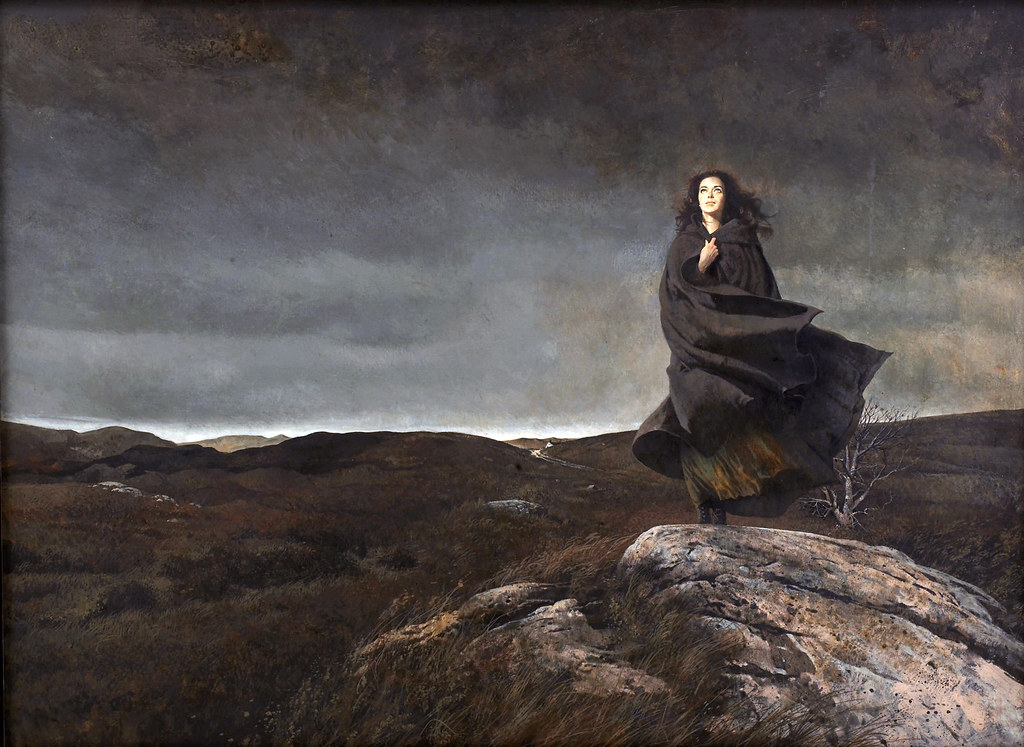My daughters don’t understand my love for Emily Brontë, and her wild and rough only novel Wuthering Heights. The typical reaction is something like this: “They are all so negative and yell at each other ALL THE TIME and destroy each other, why would you like that? Why not rather read JANE EYRE?”
Somehow, they are right, and in fact sometimes I don’t understand it myself but there it is—I am a fan. Wuthering Heights gets an annual reading, and for me it is like a slightly grim holiday, in the familiar windswept house above the moors, meeting again all of Emily’s larger-than-life characters and their titanic conflicts, playing out against snow, wind, fog and heather. A bit later in life I discovered her poems which are romantic, dramatic, set in the same Yorkshire moors, sometimes tantalisingly autobiographical—but mostly just taken from the inaccessible fantasy world of the Brontë children, the Gondal saga. They are always brilliant in language and images. Finally, many of the poems seem to have subterranean connections with the characters from Wuthering Heights, so there is another good reason for reading them.
Whenever I dip into her poems, my pencil is never far from me. I then underline the words that do not seem to rhyme from today’s perspective. Emily’s punctuation is always wild and woolly, and sometimes nonexistent, giving her poems a breathless feeling. But her rhymes are usually sharp and crisp; except when they aren’t. In 3% of the cases, “afar” suddenly rhymes with “there” or “won” with “noon”. “Break” seems to sound well with “cheek” and “moving” with “loving”. “Gloom” rhymes with “come” and “given” with “heaven”. And so the list goes on.
The wisdom of digital folk
Whenever I am in doubt about something (or simply too lazy to do research), I throw this question out to my nearly 30,000 followers on Twitter. It is surprising how much crowd intelligence and worldwide feedback can do to solve a problem, and I seem to have a Twitter group around me that enjoys these sorts of literary puzzles and games. So, when I presented my question (“Why?”), there soon seemed to be two camps: the smaller one saying “Stupid, have you never heard of half-rhymes?”; and the much larger one that put it down to “the (West) Yorkshire accent of the 1840s”. While the half-rhyme theory was quickly contested and doesn’t seem to stick with Emily’s meticulous rhyming in all of her 90 poems, I got quite a few responses that maintained that even with today’s Yorkshire dialect most of my examples would work.
For instance, @AdamAlexanderr writes: “I live 20 minutes from the Brontës’ home town and, although in the 1800s accents would have varied much more from town to town than they do today, it’s not that much of a stretch to make these words rhyme in my modern native West Yorkshire accent.”
To receive such a direct, modern answer from somebody while puzzling how to pronounce a word from a Brontë poem from the 1840s—this is what I really love Twitter for. Also, coincidentally, the thick Yorkshire dialect of Emily Bronte’s own time figures heavily in Wuthering Heights through the nearly incomprehensible rambling of the grim, Bible-quoting servant Joseph who sounds something like this:
‘What are ye for?’ he shouted. ‘T’ maister’s down i’ t’ fowld. Go round by th’ end o’ t’ laith, if ye went to spake to him.’
So while you leaf through the poems you wonder: if “boy” rhymed with “sky”, how exactly did the word sound then? You play it through in your mind, try to read it aloud—was “boy” more like “by”? Or “sky” more like “skoye”? In some cases it seems more clear. Take, for instance, the rhyme “death”/“beneath” in one poem. You can’t know whether both words were pronounced more like today’s ‘death’ or more like today’s ‘beneath’. But in another poem ‘death’ also rhymes with ‘breathe’. So once you have “death”/“beneath”/‘breathe’, the scales tip towards how the latter two words sound today. So it could be that this was how you pronounced that in Yorkshire 1840.
Or not. My eldest daughter maintains it has something to do with the great vowel shift not having penetrated into all the dialects.
And I believe I have found a tape recorder for pronunciation in the 1840s. With the help of Twitter.
Eduard Habsburg is Ambassador of Hungary to the Holy See and the Sovereign Order of Malta.
The top image shows “Wuthering Heights” by Robert McGinnis

